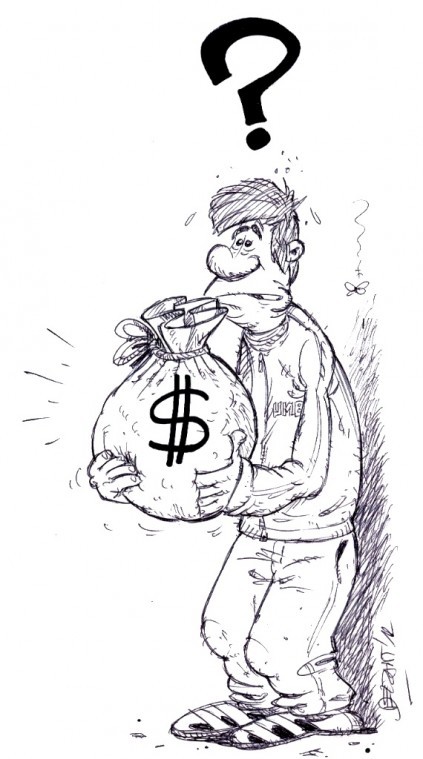Instead of increasing tuition by 4.9 percent this semester, as the Board of Trustees had intended, wires were crossed. As a result of this gaff, students have nearly $600 more than they thought.
Many who have already paid their tuition for the coming year are getting their money back in cash form the bursar’s office. Amanda Lee, a philosophy major in her final year, reported her discovery to the most reliable people on campus, The Mass Media.
“I opened my mailbox and there was this envelope with Bobby Beacon on it and he was saying ‘Oops!’ So, I assumed the worst. When I opened the letter, there were some hundred dollar bills, some smaller bills, and even some change.” To support her claim, Lee dropped the money on the table.
After fending off some of The Mass Media’s relentlessly money-hungry staff, Lee handed us a message with the university’s letterhead. “This was also in the envelope,” Lee informed us.
The letter, which many students have already received via mail or email, offers the following explanation.
Dear Student,
We regret to inform you of a grievous error on our part. The Board of Trustees intended to increase your tuition 4.9 percent, but, because of some bungled paperwork, the financial committee has not only remitted that increase, but inverted it.
This mistake is inexcusable and amateur. This is unheard of: a school reducing its tuition. It is juvenile. We know what you expect, a steep and regular increase of your tuition and fees. Instead, we’ve faltered, and give you exactly what you don’t need, more money.
Please accept our sincerest apologies, this error will be rectified next semester. In the meantime, please feel free to return the money to us.
Thank you for your understanding and patience,
Ominous, Mysterious, Faceless Board Member
Omar Southerland, freshman anthropology major, stood in the Campus Center with his money, looking confused. “I don’t know what to do with this money,” Southerland reported. “I mean, I’m so used to having to live off my mother’s income… now I have extra money? What am I supposed to do!?” he shouted, running away.
Professor of adolescent psychology André Swift made an appointment to speak with The Mass Media. “If all my sources are correct, these children will squander their money on alcohol and marijuana. After all, as anyone over the age of 40 will corroborate, that’s all college kids spend money on. That’s why the school increases its fees each semester—they know how to spend the student’s money better than the students themselves, of course,” claimed Swift confidently.
“The new admin would have squandered their extra millions on things like dormitories for future students. That’s one of the administration’s wise mantras: charge the current students so we look better for future students. It’s already working, just look at our new Integrated Science Complex. Thanks, class of 2011 and ’12!”
Lee, unlike Southerland’s hypothetical student, decided it was best to save most of her money. However, given the price of her new philosophy textbook, Lee was forced to spend $150 of it.
The administration made yet another statement recently, again apologizing for the error and asking for “our money back, and any other money you can spare.”
Professors themselves have been affected by the error. Professor of economics, Emily Tatterfield reported that, “More students had their textbooks ready and open on the very first day!” The campus bookstore reported higher-than-usual sales of various items, including UMass Boston sweatshirts, t-shirts, and pencils.
An anonymous board member stated to The Mass Media, “I’ve never seen such chaos! Students are cheerier, are able to afford things like food and clothes. It’s unnatural. It’s a good thing we’re making up for our error this semester in the quick-coming Spring 2013 semester.”
Many more mistakes like this one and soon the unthinkable might happen: college might become an affordable option for everyone.

